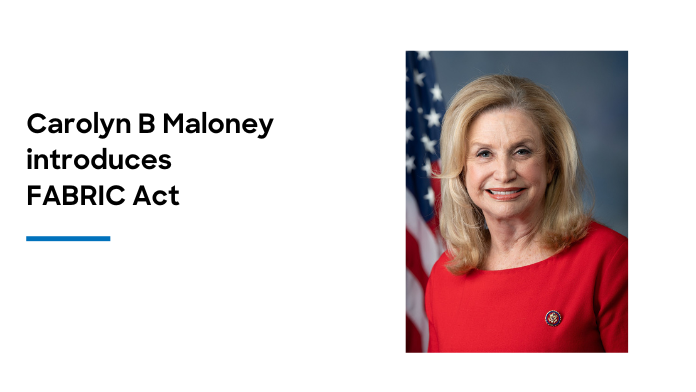The US FABRIC Act, which seeks to address the exploitation of US garment workers, was introduced to the US House of Representatives for the first time on July 21, and global advocacy organization ReMake has created a petition to gain additional support.
To cut a long story short:
- The FABRIC Act of 2022 will create a nationwide garment industry registry in the US Department of Labor to improve industry oversight and transparency.
- In addition, the bill would establish a $40 million Domestic Garment Manufacturing Support Program.
- Senator Kirsten Gillibrand introduced the historic FABRIC Act in the Senate earlier this month.
Carolyn B Maloney introduced the Fashioning Accountability and Building Real Institutional Change (FABRIC) Act of 2022 on July 21. It was co-led by Debbie Dingell, a Michigan House Representative, and North Carolina’s Deborah Ross. The Act was introduced in the House of Representatives less than three months after the bill was introduced in the Senate. However, ReMake is eager to expand its support and has created a petition that brands and organizations from all over the world can sign.
The FABRIC Act:
The Bill addresses issues in the apparel manufacturing industry such as worker exploitation, offshoring, and an aging workforce by enacting measures that would advance workplace rights, protections, and manufacturing incentives to solidify the United States as a leader in responsible apparel production.
- The FABRIC Act of 2022 will create a nationwide garment industry registry in the US Department of Labor to increase oversight and transparency in the industry, as well as requirements to hold both fashion brands and retailers, as well as their manufacturing partners, jointly accountable for workplace wage violations, establish hourly pay in the garment industry, and eliminate piece rate pay in workplaces where workers are not already paid a minimum wage or are covered by workers’ compensation.
- The legislation would also establish a $40 million Domestic Garment Manufacturing Support Program and a 30% reshoring tax credit for garment manufacturers who relocate their manufacturing operations to the United States.
Here’s what they have to say
''I have long been a champion for the New York and American fashion and apparel industries because of their immense economic and cultural benefits to our city and our nation. But all too often the workers are exploited and wages are too low for people to make a living. Cementing the United States as the global leader in manufacturing apparel responsibly by putting forth worker safeguards, increased oversight and transparency of the industry, and creating incentives to bring jobs back to the US will have positive impacts on our nation’s economy and commitment to the American worker for generations to come.’’
— Carolyn B Maloney
New York
US House of Representatives
''It’s time to take bold action at the federal level to change the fabric of the American garment manufacturing industry. Protecting the garment workforce is a sustainability issue and has direct impacts on environmental sustainability, community development, gender equality, and economic prosperity. This May, I originated the landmark FABRIC Act in the Senate to thread the needle of protecting workers’ rights, putting an end to abusive pay rates, and ensuring equitable compensation for garment workers, while also making historic investments in domestic garment manufacturing so we can not only make American, but buy American. I’m so proud to have Congresswoman Maloney, Dingell, and Ross as partners in this effort. ’’
— Kirsten Gillibrand
New York
US Senate
''Every worker in this country deserves fundamental rights and protections and the garment industry is no exception. The FABRIC Act will ensure that we follow through on our commitment to dignity in the workplace by establishing additional safeguards and standards for garment workers, increasing transparency and accountability, and developing incentives to ensure that these products are made in the United States. We have a duty to deliver for the hard-working men and women that drive our country forward every day and this legislation is one step in ensuring that the United States remains a leader in responsible manufacturing.’’
— Debbie Dingell
Michigan
US House of Representatives
''The FABRIC Act will bring garment manufacturing and textile industry jobs back to North Carolina while improving conditions and compensation for workers in garment factories. I’m proud to introduce this bill to my colleagues, and I look forward to working with them to revitalize and support garment and textile businesses in my home state. ’’
— Deborah Ross
North Carolina
US House of Representatives
Support for US FABRIC Act 2022
Remake’s director of advocacy and policy, Elizabeth Cline explained: “Our community has flooded the switchboards in Congress asking them to get the FABRIC Act moving forward. We applaud Representatives Maloney, Dingell, and Ross for prioritizing fashion’s female workforce and for seeing the opportunity in this ground-breaking bill to create a fashion industry that’s responsible, sustainable, and transparent and to influence policy on a global level. Our voices were heard.”
“We welcome the House introduction of the FABRIC Act and ask more congressmen and women on both sides of the aisle to support this bill that will rebuild American manufacturing with good paying jobs and restore dignity to the apparel sector.” adds further.
ReMake’s public petition has been launched on the official FABRIC website, giving supporters all over the world another way to show their support for the bill.
The organization says: “The time is now to rethink and rebuild the fashion industry around accountability and sustainability. With the future of fashion riding on this groundbreaking piece of legislation, time’s ticking to protect the 100,000-plus dignified apparel jobs in America and cement the US as a leader in responsible fashion production.”
Brands and organizations located anywhere in the world can endorse the official FABRIC Act site by filling out this form.
Several brands and organizations have already shown their support for the FABRIC Act on its official websites, such as ACACIA, Mara Hoffman, ThredUp, and Fashion Revolution.













